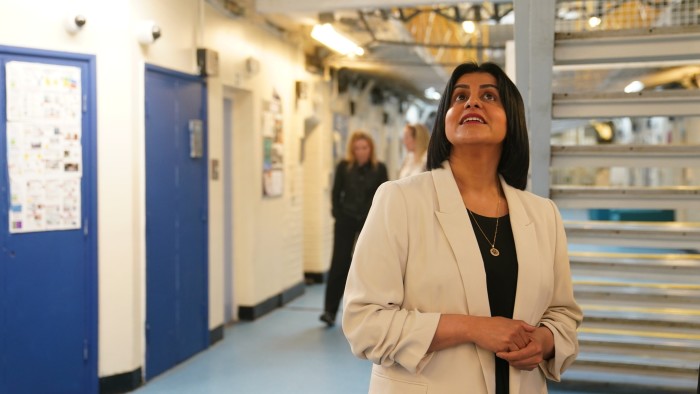Unlock the Editor’s Digest for free
Roula Khalaf, Editor of the FT, selects her favourite stories in this weekly newsletter.
The UK’s prisons will run out of space despite plans to channel several billion pounds into building four new jails, the justice secretary has said.
Shabana Mahmood warned on Wednesday that “building enough prison places is only one part of the prolonged solution” to the capacity crisis.
In a written ministerial statement to parliament, she conceded: “In the coming years, the prison population will continue to increase more quickly than we can build new prisons.”
Earlier, she explained that other efforts would be required to solve the overcrowding. “We will have to expand the range of punishment outside of prison . . . That does mean that we will have more offenders monitored outside,” she told BBC Radio 4.
Former Tory justice secretary David Gauke has been tasked with leading a review of sentencing, which is likely to propose alternatives to prison for some offences, such as imposing house arrest.
Mahmood confirmed the review would make recommendations early next year. She stressed it would ensure “there is always a prison place for dangerous offenders” while broadening the scope of punishments outside prison for less serious crimes.
Ministers are also likely to override local objections to new prison sites. Asked whether the government would fast-track applications and over-rule the objections of local people and local councils, Mahood told BBC Breakfast: “Yes.”
She highlighted Labour’s manifesto pledge to consider prisons to be sites of “national importance” and “critical infrastructure projects”, paving the way for housing secretary Angela Rayner to unblock stalled planning applications for new sites.
On Wednesday, the Ministry of Justice published a 10-year prison strategy and the first annual statement on prison capacity.
The department set out plans to spend £2.3bn over the next two years on creating 6,400 extra jail spaces in newly built prisons.
It is part of a wider plan to establish 14,000 additional cell spaces in total by 2031, some from building new wings or refurbishing unused facilities at existing prisons.
The government’s aim is to secure new land so that it is prepared to build more new prisons if they are needed.
Prisons in England and Wales were near capacity when Labour won power in July. To alleviate the crisis and create some space for new offenders the government is releasing about 5,000 prisoners early.
However, prisons are expected to reach critical capacity again by next July.
MoJ figures showed there were 86,089 adult prisoners in jail in England and Wales this week, while more than 100,000 prisoners could be held by 2029, according to official figures published earlier this month.
Mahmood laid the blame for the current crisis at the feet of the last Tory administration, accusing it of adding only 500 additional cells and falling far short of its promise to deliver 20,000 extra places by the mid-2020s.
She said the cost of expanding the nation’s prison estate to fulfil this commitment would reach up to £10.1bn, an increase of £4.2bn on the estimate signed off by the previous administration in the 2021 spending review.
Pia Sinha, chief executive of the Prison Reform Trust, which campaigns for a more humane and effective penal system, said some investment was always going to be needed to avert dangerous levels of overcrowding and deteriorating conditions in prisons. But she added that the sentencing review was also “vital to bringing our use of imprisonment down to a more proportionate and sustainable level”.



